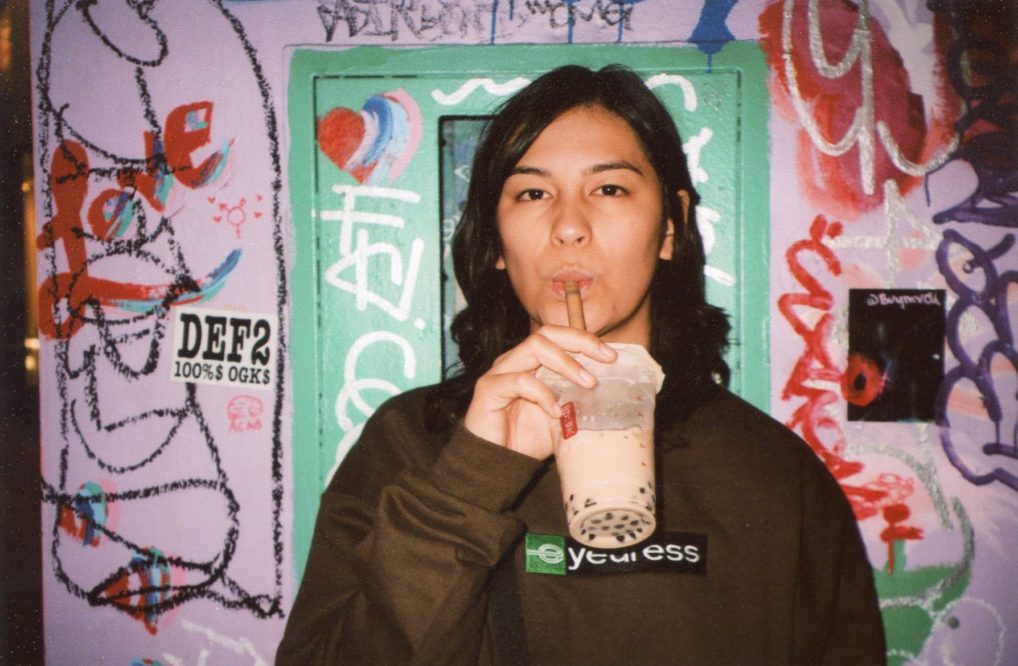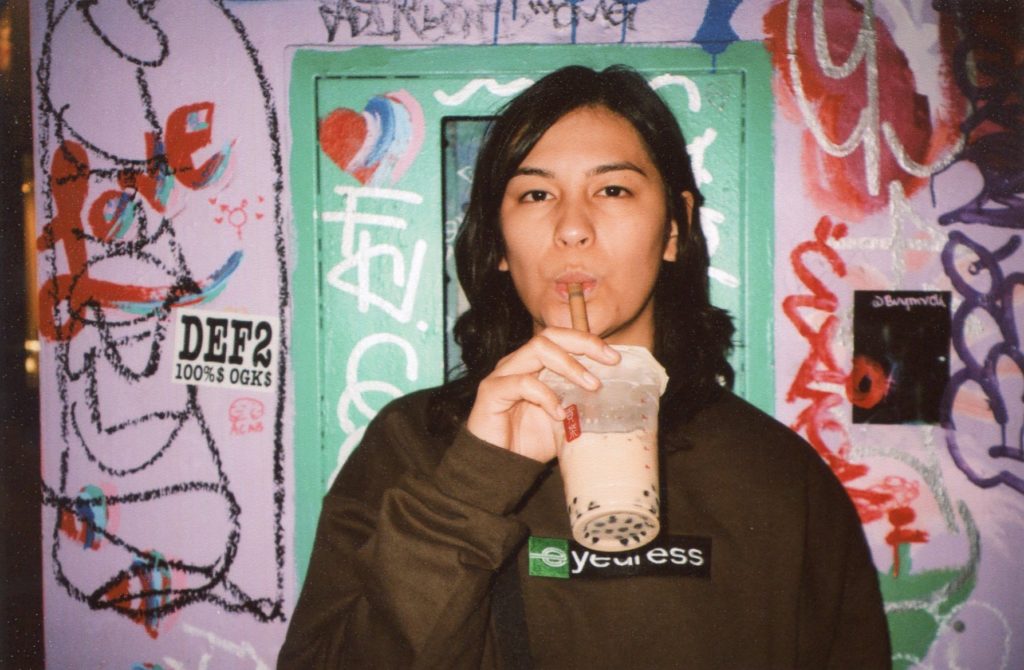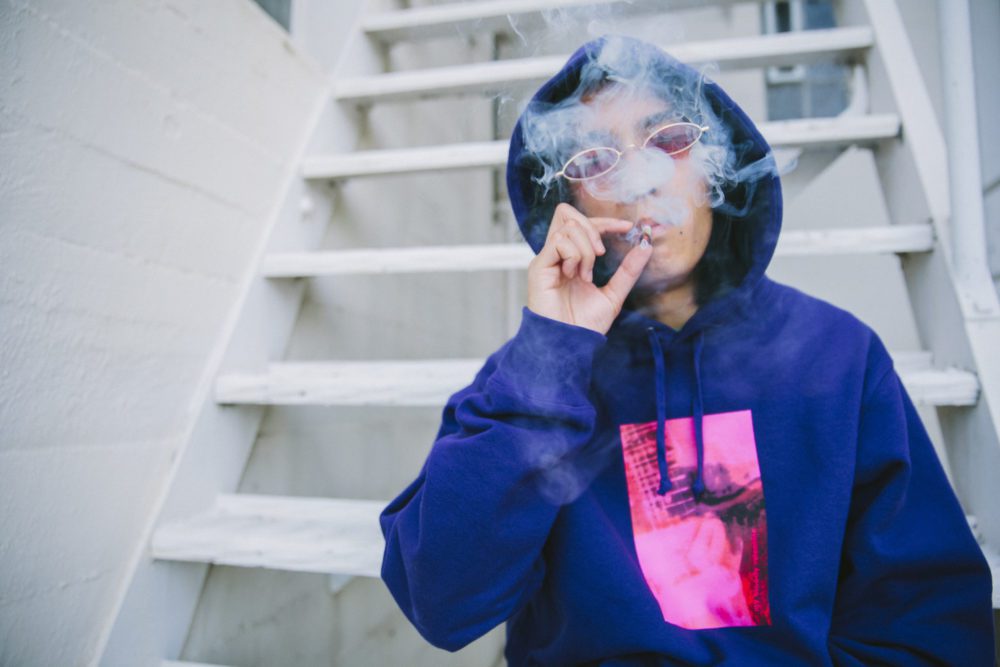

On her debut single “Starry Eyed,” ZZZAHARA (a.k.a. Zahara Jaime of The Simps and Eyedress) proclaims, almost proudly, “I’m already on my way/One foot out, and one foot in the grave.” This morbid hokey pokey isn’t mere ambivalence; it’s a vehicle for Zahara’s existentialist approach to life and making music, one in which she controls her own decisions and finds her own meaning in an often irrational world, moment to moment.
Zahara’s nonchalant carpe diem philosophy was influenced by unthinkable tragedy – the “close calls” she’s had with death since the age of twelve, when her younger brother passed away from Leigh Syndrome after a long and agonizing hospitalization. Zahara mentions her late brother in “Starry Eyed” only briefly, but the impact of his death is something she only recently came to terms with. “It just really boinked what I thought about life. All my friends lived a normal life, but I couldn’t wrap my head around what I was going through. I guess it kinda hit me in my early adult years, like what the hell did I see?” Zahara says. “It was confusing, that’s how I would describe it. I was sad but… I never processed it really, I just was worried about my parents. But then as I got older I was like, you know what, actually I have to process it myself.” Zahara says that therapy, philosophy, and music have all played a role in making sense of what happened. “Ultimately, my philosophy, it’s not too dark. It’s just like, I have to deal with making the world a comfortable place for me to live in, but I also want it to be comfortable for everybody that I let in.”
“Starry Eyed” finds Zahara taking comfort in sleeping all day, drinking all night, and sometimes just closing her eyes and pretending she doesn’t exist. The video was shot by first-time director (and Zahara’s roommate) J.J. Lammers; black and white scenes give it a noir feel. Zahara pours whiskey in her coffee, explores a graveyard. Suddenly she’s lying in the bottom of a hole in the ground, covered in a fine layer of dirt. In the next scene, she’s also the one shoveling – a literal interpretation of line that repeats in an otherwise minimal chorus: “I’m d-d-d-d-igging my grave.”
Zahara says the line is reflective of her cavalier approach to mortality, and also how she feels about living in general. “I do struggle with depression sometimes. There are times where I’ll sleep for a week and I’ll feel okay the rest of the month,” Zahara admits. “I live life on the edge a little bit… I like to have fun and sometimes that fun is a little risky. A lot of people fear death – people that look to life as something to be super optimistic about. I’m kind of in this purgatory, like in the middle where it’s not so good but it’s not so bad.”
Like it has for so many others, the pandemic threatened Zahara’s characteristic stoicism when she lost her day job. But she took it in stride, using the combination of unemployment funds and spare time to get serious about home recording. Zahara had played in bands for years in and around the Highland Park neighborhood where she grew up, and recently joined forces with Idris Vicuña, playing guitar in his project Eyedress. The two are also planning to release music from their collaborative project, The Simps, by the end of this year.
Zahara says Vicuña’s encouragement and guidance sparked her interest in producing her own music, and was further buoyed by support from her friend Collin Cairo, a mixing engineer at Stones Throw. Cairo pointed her toward YouTube and Sound on Sound Magazine; eventually, Zahara invested in a thirteen-hour online engineering course with Alan Parsons, as well as new mics, a laptop, software plug-ins, a synth and a bass guitar. Every other day, Zahara would record a new song based on what she’d learned from Parsons’ videos, and those songs comprise ZZZAHARA’s debut EP, out October 23.
“Everything that I learned from those classes I really put into what I made on this EP,” explains Zahara. “It’s kind of like giving yourself homework. [My] music from the start of quarantine to the end [shows that] progress: watch some things, learn things, take from it, and then do whatever you like. That’s what I was doing all of quarantine.”
The EP deals mostly with being young, queer, and looking for love. “Spam Masubi Cigarette” is a heart-pounding tribute to her current partner, who she says she was grateful to get to know better when the pandemic drew them closer. “Up On Fig” and “Straight Crushes” describe more confusing situations – an affair with a neighbor, unrequited teenage fantasies about girls with boyfriends – and though “Starry Eyed” is somewhat of an outlier thematically, all four tracks are tied together with dreamy, shimmering production and Zahara’s wistful reverb-heavy vocals. Cairo helped mix the EP, but the production was all Zahara. The vocal effects were recorded on a performance mic and edited with Ableton plug-ins – another trick she learned from Parsons’ videos, particularly one that featured Lauryn Hill.
Though it may never have existed if not for the pandemic, the EP is much more than a holdover linking Zahara’s musical past and her future. “I’m just really proud of being able to produce an entire EP by myself during quarantine,” Zahara says. “This is basically me saying hey – I learned something and here’s a little piece of me. If I seem mysterious, it’s kind of an introduction to who I am.”
Follow ZZZAHARA on Instagram and Twitter for ongoing updates.


